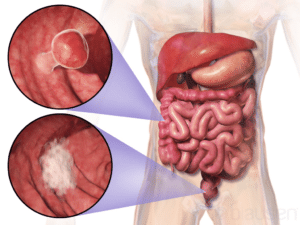
Colorectal cancer starts in the large intestine (colon) or the rectum and is the second leading cause of cancer death in the US, second only to lung cancer. Your doctor may refer to these cancers as colon cancer or rectal cancer depending on where they occur. Medical professionals often group these types of cancer because they have many similarities.
Who Gets Colorectal Cancer?
Men and women get colorectal cancer equally, which means everyone needs colorectal cancer screening. The risk of colorectal cancer increases as you age, but it can occur in young adults and teenagers. However, the majority of colorectal cancers occur in adults age 45 or older. Research shows the average age for colon cancer in men is 68 and 72 for women. Your chances of developing colorectal cancer may also increase if you have any risk factors.
How Does Colorectal Cancer Start?
Colorectal cancer begins as a polyp. Polyps are small, benign (non-cancerous) clumps of cells that form inside the colon. Most colorectal polyps do not become cancer, but virtually all colorectal cancers begin as a polyp. It’s also possible for colorectal cancer to develop from abnormal cells in the lining of the colon or rectum, but this is a much rarer occurrence.
Symptoms of Colorectal Cancer
Colorectal cancer usually doesn’t have any symptoms during the early stages of the disease. The lack of symptoms makes it essential to get tested early and often when the cancer is easiest to treat.
If you do have symptoms, the most common include:
- Changes in your bowel habits, including constipation or diarrhea that won’t go away
- Feeling that you urgently need to have a bowel movement or that you can’t empty your bowels
- Rectal bleeding
- Blood in the stool or dark stools
- Abdominal cramping, bloating or pain
- Weakness and fatigue
- Unexplained weight loss or loss of appetite
In most cases, people who have symptoms do not have cancer. However, if you are experiencing any of the symptoms of colorectal cancer, you should visit your doctor so the caused can be determined and treated.
Colorectal Cancer Screening & Treatment
NVSCC provides both colorectal cancer screening and treatments. A colorectal cancer screening typically involves a colonoscopy. Many insurance companies will pay for the entire cost of the procedure without a copay or deductible. The recommendations to start screening for colon and rectal cancer are:
- If a person has never had colorectal cancer or polyps and has no relatives with cancer or polyp then age 50
- If a first-degree relative (parent, sibling or child) had cancer or polyps diagnosed after age 60 or two second-degree relatives have had colorectal cancer then age 40
- If a first-degree relative was diagnosed with cancer or polyps at or before age 60 or two first-degree relatives at any age then age 40 or 10 years before the youngest affected relative (whichever is first)
If a person has a history of multiple family members with cancer even of different kinds of cancer, they should talk with their doctor about genetic testing as they may need to start screening as early as age 20 or even in younger in special circumstances.
If the test is normal, it may only need to be repeated every ten years. If cancer is detected surgery is usually required. A specialist in colon and rectal surgery can give you the greatest chance of successful surgery with fewer complications, a greater chance of avoiding a colostomy, better cancer outcomes and better quality of life
Experienced Colorectal Cancer Doctors
At NVSCC, our goal is to make each of our patients feel comforted and informed of their future. We are one of the leading Las Vegas colorectal cancer centers due to the experience of our doctors on staff. We understand the importance of cancer prevention, and we make the health of our patients the main focus of their treatment. For the care and compassion you need, schedule an appointment with one of our caring doctors today!
